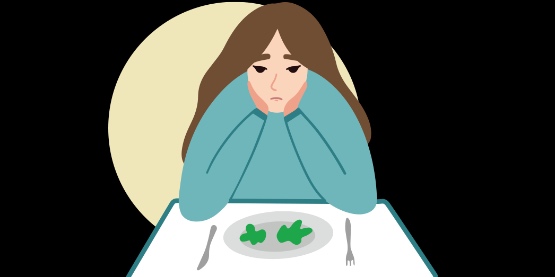
PICA
Consistent eating of non-nutritive substances for at least one month. The attitude of eating non-nutritive and non-nutritive substances is not compatible with the developmental level of the person. This eating behavior is not a culturally based or socially acceptable practice.
Withdrawal
Removing frequently eaten food for at least one month. Removed food can be re-chewed, re-swallowed, or spit out. Frequent withdrawal cannot be attributed to a concomitant gastrointestinal disease or other health condition (eg, gastroesophageal reflux, pyloric stenosis). This eating disorder does not occur only during the course of anorexia nervosa, bulimia nervosa, binge eating disorder, or avoidant/restricted food intake disorder.
AVOID/RESTRICTED EATING
Binge eating disorder An eating or nutritional disorder (e.g., lack of attention to eating or food) as manifested by a persistent lack of adequate nutrition and/or energy needs, accompanied by one (or more) of the following: ; avoiding the sensory properties of food; worrying about the odious consequences of eating). Significant weight loss (or failure to achieve expected weight gain or growth stagnation in children)
- A marked nutritional deficiency. Adhering to enteral feeding or oral nutritional supplements.
- Significant decline in psychosocial functioning.
- This disorder is not better explained by the lack of available food or a culturally sanctioned practice.
ANOREXIA NERVOSA:
The term anorexia refers to loss of appetite, while nervosa refers to emotional causes.The term is in some ways a misnomer; because anorexic patients do not actually lose their appetite or interest in their food. On the contrary, these patients are overly concerned with food, despite starving themselves; they can constantly read cookbooks and prepare special meals for their families. In anorexia, a person stops food intake for so long that he can lose 20-50% of his body weight. For example, a person who weighs 60 kilograms can drop to 30 (!) kilograms in a short time. Anorexic person has a lower body weight than expected, but is extremely afraid of gaining weight and has a disorder in perceiving his own body shape and weight.
BULIMIA NERVOSA
In the eating disorder called bulimia, which is more common than anorexia, there are bouts of binge eating and choking. In these seizures, the person eats much more than a particular person can eat in a much shorter time. The person does not feel and cannot balance the need and satiety to eat. After eating so much food involuntarily, the bulimic person becomes worried about gaining weight, and to avoid this, he starts the vomiting reflex by placing his fingers on his throat and empties the contents of his stomach. Bulimia occurs in early adolescence, especially in women. The most important feature of bulimia is that these uncontrolled eating and purging episodes have become repetitive and chronic. Like anorexia patients, patients with blumia fear gaining weight, and their self-worth is largely dependent on maintaining a normal body weight. Bulumia usually begins in late adolescence or early adulthood. Many patients with bulimia are above normal weight before the onset of the disorder.Bulumia often coexists with many other disorders, such as depression, personality disorders, and anxiety disorders.
BIG EATING DISORDER:
Recurrent episodes of binge eating. A binge eating episode is characterized by both:Eating clearly more food than most people would eat in similar circumstances in a similar period of time, in a separate unit of time (eg, in any two-hour period). During this period, feeling of being out of control of eating (e.g., feeling that the person cannot stop eating, feeling that they cannot control what or how much they are eating). Binge eating episodes are accompanied by three (or more) of the following:
- Eating much faster than usual.
- Don't eat until you feel uncomfortably full.
- Do not eat excessively when you are not physically hungry.
- Don't eat on your own because you're ashamed of how much you've eaten. Don't feel disgusted, depressed, or feel great guilt later on.
